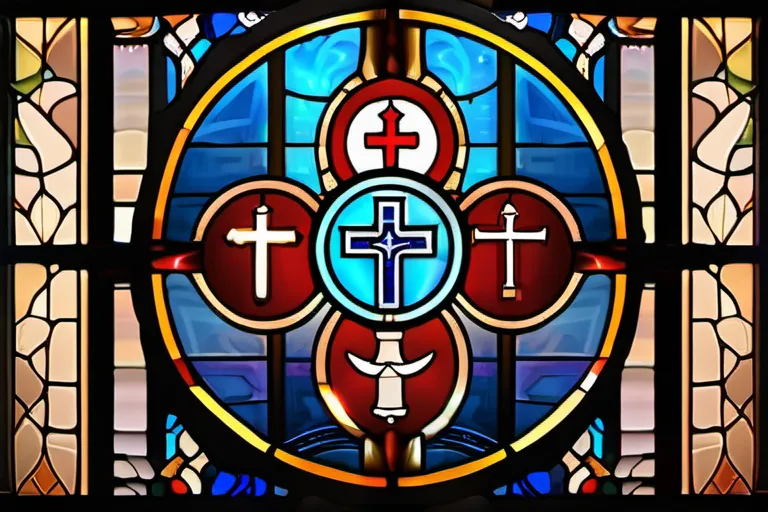Explore the history, significance, and key tenets of the Nicene Creed.
The Nicene Creed is a fundamental statement of faith in Christianity. Originating from the Council of Nicaea in 325 AD, this creed has been a cornerstone of Christian belief for centuries. In this article, we delve into the history, significance, and key tenets of the Nicene Creed.
The Origins of the Nicene Creed
The origins of the Nicene Creed are deeply intertwined with one of the most pivotal moments in Christian history—the Council of Nicaea, held in 325 CE. Imagine, for a moment, if you will, a bustling city where leaders from all corners of the Roman Empire gathered to address the pressing issues facing their faith. What led them to such an urgent assembly?
At that time, debates about the nature of Christ’s divinity were rampant, and various theological views threatened to divide the Church. The Christological controversy, centered around Arius who claimed Jesus was a created being rather than co-eternal with God, caused significant disruption. Could such a disagreement really be so consequential that it required a council to resolve it?
The Emperor Constantine, recognizing the potential for chaos and unrest, decided to convene this assembly to bring about unity within the Church. The Council of Nicaea was not just a meeting; it was a watershed moment that would shape Christian doctrine for centuries to come.
During these discussions, the Nicene Creed was formulated. It sought to clarify the relationship between Father and Son in terms that affirmed Christ’s full divinity while rejecting the Arian heresy. The creed became a powerful tool to counteract false teachings and ensure doctrinal consistency across different regions.
The Nicene Creed, as it emerged from this council, serves as a testament to the collaborative efforts of bishops and theologians. It is more than just a statement of belief; it’s a declaration of faith that has stood the test of time, ensuring that the core tenets of Christianity remain intact against challenges.
So, what does the Nicene Creed tell us about its creators? That they were men of vision and determination, aware that their decisions would echo through generations. The creed they crafted remains a cornerstone of Christian theology today, a living testament to the enduring power of collective wisdom in shaping one’s faith.
Can you imagine the weight on their shoulders as they debated and finally affirmed this creed? It was not merely a declaration but a battle against doubt and division, a beacon guiding believers through the labyrinth of complex theological issues.
The Significance of the Nicene Creed
The Nicene Creed has been a cornerstone of Christian doctrine for centuries, playing a pivotal role in shaping the faith and its practices. Have you ever wondered how this ancient statement of belief has stood the test of time? The Nicene Creed emerged from the Council of Nicaea, where bishops from across the Roman Empire gathered to address the Arian controversy. This dispute centered around the nature of Christ’s divinity, questioning whether He was truly equal with God the Father or merely a created being.
The creed that resulted from this council is not just a historical relic; it serves as a living testimony to the ongoing struggle within Christianity to reconcile faith with reason. It acts like a lighthouse in a stormy sea of theological debate, guiding believers towards a unified understanding of their beliefs. By affirming Christ’s full divinity and His miraculous birth through the Holy Spirit, the Nicene Creed addresses some of the most fundamental questions that Christians grapple with: Who is Jesus? How can He be both fully human and fully divine?
The impact of the Nicene Creed on Christian history cannot be overstated. It was instrumental in solidifying the doctrine of the Trinity, which has been central to Christian theology ever since. This creed also laid down the foundation for the Ecumenical Councils that followed, emphasizing the importance of consensus among Christians worldwide. The Nicene Creed’s influence extends beyond mere theological debates; it serves as a unifying force that brings together diverse communities under shared beliefs.
By understanding and embracing the Nicene Creed, believers can navigate the complexities of their faith with greater clarity. It is more than just a recitation—it is an affirmation of belief that strengthens one’s spiritual journey. In a world where religious identities are often challenged, the Nicene Creed stands as a reminder of the common ground shared by Christians everywhere. How can such a simple statement have such profound implications for our faith and daily lives?
As we explore further into the key tenets of the Nicene Creed in the next section, let us reflect on how this ancient creed continues to shape not only Christian doctrine but also the very essence of what it means to be a believer. The Nicene Creed is more than just words—it is a living legacy that bridges past and present, guiding Christians through the ages.
Key Tenets of the Nicene Creed
The Nicene Creed, like a map charting the course of Christian doctrine, delineates the key beliefs that have guided Christians for centuries. But what exactly are these beliefs? Why did the early church find it necessary to articulate them in such detail?
Firstly, let’s explore the Holy Trinity. This concept is pivotal because it addresses the nature of God as a triune being: Father, Son, and Holy Spirit. Can we truly understand how these three persons are united yet distinct? How does this belief shape our understanding of worship and prayer?
The divinity of Christ is another cornerstone of the Nicene Creed. It asserts that Jesus Christ is one in essence with God the Father, highlighting His divine nature alongside His humanity. Rhetorically, how can we reconcile these two aspects without compromising either? The metaphor of a river flowing from its source comes to mind—just as water retains its essence while changing form, so too did Christ retain His divinity during His earthly ministry.
The resurrection of Jesus is also explicitly stated in the Nicene Creed. This belief isn’t just about a historical event; it’s a profound declaration of hope and eternal life. How does the resurrection impact our faith? Can we truly grasp its significance, or do we merely scratch the surface?
These tenets form the bedrock upon which Christian theology stands. They answer fundamental questions: Who is God? What is the nature of Christ’s mission? And what lies ahead for believers after this life? The Nicene Creed serves as a living document that continues to inspire and challenge Christians in their faith, making it more than just words on a page but a vibrant expression of belief.
The Nicene Creed’s Influence on Christianity
The Nicene Creed has undeniably shaped Christian practice, liturgy, and theology throughout history, acting like a lighthouse guiding faithful souls through the tumultuous seas of belief. How many times have you heard this creed recited during worship services? Have you ever stopped to ponder its profound influence on shaping your spiritual journey?
Consider for a moment the early Christian communities grappling with heretical doctrines that threatened their very foundations. The Nicene Creed, crafted in response to these challenges at the Council of Nicaea in 325 AD, provided a clear and concise statement of orthodox doctrine. It essentially became a bulwark against theological uncertainties, much like how a fortress protects its inhabitants from invaders.
The creed’s emphasis on the divinity of Christ and the Holy Trinity laid the groundwork for Christian worship. How many liturgies do you participate in where these concepts are celebrated? From the Eucharistic prayers to the hymns sung during Mass, the Nicene Creed underpins much of what we do and believe. It serves as a common thread that ties together diverse Christian traditions, allowing believers from different backgrounds to unite under one theological banner.
Moreover, the Nicene Creed has influenced the development of Church doctrine over centuries. How many times have you seen it invoked in discussions about heresy or orthodoxy? Its enduring presence ensures that core Christian teachings are preserved and passed down through generations. It’s like a family heirloom, cherished for its history and value.
The creed’s impact extends beyond liturgy into academic theology as well. Theological debates often return to the Nicene Creed as a reference point. How many scholarly works have you read that cite this ancient document? Its clarity and precision have made it a cornerstone in theological discussions, providing a framework for understanding complex doctrines.
In essence, the Nicene Creed has become an integral part of Christian identity and practice. It serves not just as a historical document but as a living entity that continues to shape faith and worship today. As you reflect on its importance, consider how it guides your own spiritual life and connects you with millions of believers across time and space.
The Nicene Creed Today
The Nicene Creed today stands as a beacon, guiding Christians worldwide through a map that outlines their faith journey. But how does it resonate in our modern world? Isn’t Christianity just another historical relic, irrelevant in today’s fast-paced, secular society?
Think about it: the Nicene Creed is more than just a document—it’s a living, breathing testament to unity and truth. It’s like a lighthouse in a stormy sea, offering direction amidst the chaos of life. In a world where beliefs are fragmented and often at odds with one another, how can such an ancient statement still hold relevance?
Let’s consider its role in contemporary Christianity. The Creed serves as a common ground, allowing Christians from diverse backgrounds to come together under a shared understanding of their faith. It’s not just about reciting words; it’s about embracing the unity that these words represent.
Imagine a vast tapestry, with each thread representing different Christian denominations. Each denomination has its own rich history and unique practices, yet they all hold onto this creed as a common thread, weaving together a beautiful and cohesive fabric of faith. This unity is not just theoretical; it’s practical, providing a foundation for dialogue and mutual respect.
Moreover, the Nicene Creed addresses fundamental truths about God’s nature—His oneness, His relationship with Christ, and the Holy Spirit. These are not just academic concepts but form the very essence of our faith. How can we ignore such profound insights in our understanding of God?
In a world that often seeks to divide us, the Nicene Creed is a powerful tool for unity and peace. It reminds us that despite our differences, we share a common belief in the triune nature of God and the saving work of Christ. This shared belief can be a bridge across denominational divides, fostering understanding and cooperation.
So, as we navigate the complexities of modern life, let us remember the Nicene Creed. It’s not just history; it’s a living document that continues to shape and strengthen our faith. By embracing its teachings, we can find common ground, promote unity, and deepen our spiritual lives.
What if, in your journey of faith, you could find such a strong foundation? Could the Nicene Creed be that cornerstone for you?
Reflections on the Nicene Creed
Imagine stepping into a cathedral filled with the echo of hushed prayers and the rhythmic chanting of ancient hymns. The Nicene Creed, recited in this hallowed space, serves as a bridge between the past and present, a timeless declaration that connects believers across centuries. As you listen to the creed being spoken aloud, it is hard not to wonder: What does it mean for our faith journey today?
The Nicene Creed is like a lighthouse in the stormy sea of theological disputes, guiding us through the turbulent waters with its clear and unequivocal statements. It was born out of necessity during the 4th century, when the Christian church faced significant challenges, most notably the Arian controversy. Arius proposed that Jesus Christ was not fully God but a created being, which posed a severe threat to the core beliefs of Christianity. The Nicene Creed emerged as a response to these controversies, affirming the divinity of Christ and shaping the framework for what we now know as orthodox Christian doctrine.
Reflect on your own journey through faith. Have you ever questioned who Jesus is? How does believing in his full divinity impact your understanding of salvation? The Nicene Creed offers a clear answer: Jesus Christ, one with the Father and Holy Spirit. This belief isn’t just intellectual; it’s transformative, changing how we view our relationship with God and others.
The Nicene Creed is more than just a statement of belief. It’s a lived experience that shapes every aspect of our faith, from worship to service. As we recite its words, we are not merely repeating history; we are participating in the ongoing conversation of Christian tradition. Each time we utter those familiar lines, “I believe in one God, the Father Almighty,” we reaffirm our commitment to a faith that has stood the test of time.
Conclusion
 The Nicene Creed serves as a unifying force among Christians worldwide. By understanding its origins and core beliefs, we gain a deeper appreciation for the rich history and unity of our faith.
The Nicene Creed serves as a unifying force among Christians worldwide. By understanding its origins and core beliefs, we gain a deeper appreciation for the rich history and unity of our faith.











